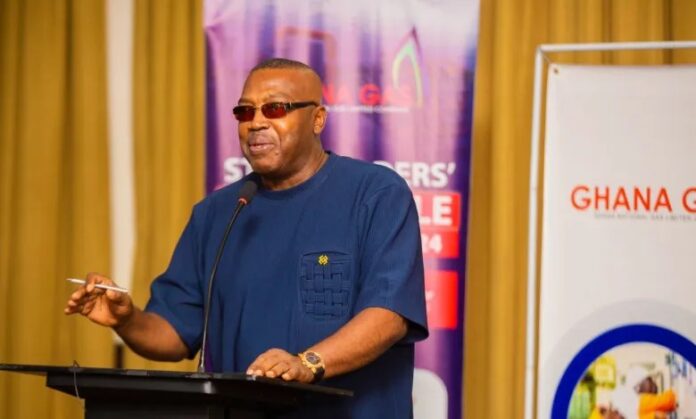The chief executive officer of Ghana National Gas Limited Company, Ben K.D. Asante, has called for the swift implementation of a “Gas Act,” describing it as crucial for driving the sector forward.
The Gas Act, if implemented, would provide guidelines for all stakeholders in the energy sector.
Speaking at the 2024 stakeholders’ roundtable under the themed “Building an Effective Gas Sector Revenue Management System: The Role of Stakeholders,” Asante emphasised the need for access to capital, particularly in Africa, where infrastructure development is capital-intensive.
“If you are going to be having a facility or infrastructure, you need access to capital, particularly in our part of the world, and then, develop the secondary market.”
“So, currently, we use about 85–90% of our gas for power generation, but we also need to accelerate the use of gas for non-power applications and, last, but not least, the Gas Act.”
“Now, when we start, we’re looking forward to accelerating the finalisation and implementation of this Gas Act because that’s the only way we can provide some impetus to all the things that we are talking about,” Asante said.

Also, Asante advocated for increased private sector participation, access to finance, and local content provisions to build capacity and ensure sustainability.
“We also need access to finance and transactions. We have to encourage private sector participation in the industry. That is one of the ways we can actually sustain the industry. So, we need that as well and then, local content provision to build capacity or sustainability,” he added.
Meanwhile, the Minister for Public Enterprises, Joseph Cudjoe, urged Ghanaians to reconsider their approach to electricity consumption and payment, highlighting the need for a shift in mindset towards treating electricity as a valuable service that must be paid for.
“As you see MTN growing, nobody, no citizen, is bringing any pressure to bear on the government that MTN should give us data, that MTN should give us airtime. But when it comes to electricity, we plug in and join and when it comes to the pricing and paying for the service, they will put the pressure on the government. So all citizens, we should also be engaging our thinking. What do we want? So far as electricity as a product or a service is concerned, we should also be involved and think through it rightly,” Cudjoe asked.
Cudjoe also appealed for the privatisation of some parts of the electricity sector. This, he believes, will enhance efficient and proper pricing mechanisms.
“If that is not the case, that we want electricity to be delivered the way we are having it, it should be funded. Then the government should introduce taxes to pay for it, for us, so that we can get it the way we want because if we don’t fund the service delivery by way of investing in ECG so that they will be up and doing, then, I’m saying, end of the day, one day, the company runs aground,” Cudjoe added.
The roundtable discussion brought together key stakeholders in the gas sector to deliberate on ways to enhance the sector’s revenue management system.


